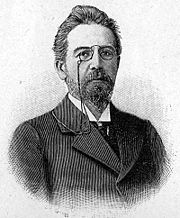アントン・チェーホフ
表示
| 文学 |
|---|
 |
| ポータル |
|
各国の文学 記事総覧 出版社・文芸雑誌 文学賞 |
| 作家 |
|
詩人・小説家 その他作家 |

アントン・パーヴロヴィチ・チェーホフ︵Антон Паврович Чехов、Anton Pavlovich Chekhov, 1860年1月29日 - 1904年7月15日︶はロシアを代表する劇作家であり、また優れた短編小説家である。タガンローグに生まれ、ドイツのバーデンワイラーで療養中に死去した。
生涯
アントン・チェーホフは、父パーヴェル・エーゴロヴィッチ・チェーホフと、母エヴゲーニャ・ヤーコヴレナ・チェーホワの3男として生まれた。 兄にアレクサンドル・パヴロヴィッチ・チェーホフ、ニコライ・エーゴロヴィチ・チェーホフ、弟にイワン・パーヴロヴィチ・チェーホフ、ミハイル・パーヴロヴィチ・チェーホフ、妹にマリア・バーヴロヴナ・チェーホワがいる。 1884年にチェーホフは医師としての資格を得たが、ほとんど診療行為を行っていない。医学を実践するかわりに彼は数百を数える自らの小説の中で、病気を診断するようなアプローチで日常の生活を観察した。 モスクワ芸術座で成功を収めた﹃かもめ﹄の後、チェーホフは同劇場のため三つの戯曲﹃ワーニャ伯父さん﹄﹃三人姉妹﹄﹃桜の園﹄を書いた。1901年にチェーホフはオルガ・レオナルドヴナ・クニッパー︵1870年-1959年︶と結婚した。オルガは女優で、チェーホフ作品の上演を数度行っている。 演劇における自然主義の波はヨーロッパ全体を席巻し、1898年のロシアにおいてその芸術的高みに達した。この年、モスクワ芸術座︵後のモスクワアカデミー芸術座︶が結成された。モスクワ芸術座の名はチェーホフの名と同義になった。地主階級の日常生活をとりあげたチェーホフの作品は、その時代を数年先取りした繊細で私的なリアリズムを達成していた。モスクワ芸術座の芸術監督コンスタンティン・スタニスラフスキーは、20世紀演劇におけるもっとも影響力のある理論家となったのである。 チェーホフは裕福な新聞社経営者 A.S.スヴォーリン に同行して西ヨーロッパを訪れた。スヴォーリンはチェーホフの作品多数を出版していた。二人の長く親密な友人関係は、チェーホフがやや一般受けしない原因にもなった。スヴォーリンの新聞﹃ノヴォーイェ・ヴレーミャ﹄︵﹃新時代﹄︶は政治的には反動の性格を帯びていたのである。 Eventually Chekhov broke with Suvorin over the attitude taken by the paper toward the notorious Alfred Dreyfus affair in France, with Chekhov championing Dreyfus. チェーホフは結核で死亡し、現在はノヴォデヴィチ墓地に葬られている。評価
アントン・チェーホフはロシア最大、おそらくは世界でも有数の巧みな小説作家である。また最晩年の四つの戯曲、﹃かもめ﹄﹃三人姉妹﹄﹃ワーニャ伯父さん﹄﹃桜の園﹄の作者として、伝統的な戯曲と対照を成す新たな領域を切り開いた劇作家でもある。これらの戯曲や小説の与えたインパクトは多く暗示と巧みなアンチクライマックスによる。 19世紀末にチェーホフは短編小説に革命を起こした。チェーホフのように第1級の小説を絶えず発表した作家はいなかった。チェーホフはしばしばギ・ド・モーパッサンと比較されるが、チェーホフは伏線を計算して配置するプロットを凝らした小説にはあまり関心をもたなかった。チェーホフの小説では実際のところほとんど何も起こらない。登場人物とその生活が前面に出てくるのである。モーパッサンが出来事に焦点を当てたのに対し、チェーホフは人物に目を注いだといえる。 典型的なチェーホフの話は外的な筋をほとんどもたない。物語の中心はしばしばある登場人物の内側に起こることにあり、この物語は示唆により、あるいは意義深いディティールにより、間接的に担われる。しばしばいわれることであるが、チェーホフの小説や劇においては何も起こらない。しかしチェーホフは内面のドラマを展開させる独自の技をもっており、それで目立った事件が起こらないことは十分に埋め合わされている。チェーホフが主に扱う主題は労働と愛であるが、登場人物たちはどちらにも関心を示さない。チェーホフの若い登場人物はたいがいが幻想に囚われており、年老いた登場人物は幻滅にさいなまされている。時間の経過がつねに関心の中心を占め、日常のささいなことや脱線、人生の意味の結局は失敗に終わる探求が取り上げられる。 Especially noteworthy amongst his stories are "Skuchnaya istoriya" (written 1889; "A Dreary Story"), "Duel" (written 1891; "The Duel"), "Palata No. 6" (written 1892; "Ward Number Six"), "Kryzhovnik" (written 1898; "Gooseberries"), "Dushechka" (written 1899; "The Darling"), "Dama s sobachkoy" (written 1899; "The Lady with the Dog"), "Arkhiyerey" (written 1902; "The Bishop"), and "Nevesta" (written 1903; "The Betrothed"). Stories like "The Grasshopper" (1892), "The Darling" (1898), and "In the Ravine" (1900)--to name only three--all reveal Chekhov's perception, his compassion, and his subtle humour and irony. One critic says of Chekhov that he is no moralist--he simply says "you live badly, ladies and gentlemen," but his smile has the indulgence of a very wise man. As samples of the Russian epistolary art, Chekhov's letters have been rated second only to Aleksandr Pushkin's by the literary historian D.S. Mirsky. Although Chekhov is still chiefly known for his plays, critical opinion shows signs of establishing the stories--and particularly those that were written after 1888--as an even more significant and creative literary achievement. In his dramatic works Chekhov sought to convey the texture of everyday life, moving away from traditional ideas of plot and conventions of dramatic speech. Dialogue in his plays is not smooth or continuous: characters interrupt each other, several different conversations often take place at the same time, and lengthy pauses occur when no one speaks at all. His plays commonly feature the struggle of a sensitive individual to maintain his integrity against the temptations of worldly success. A recurring theme is the pointlessness of radical, human/mechanical change, versus the powerful inertia of slow natural/organic cycles. One of the actors once told Chekhov that Stanislavsky intended to have frogs croaking, the sound of dragonflies, and dogs barking on the stage. "Why?" Chekhov asked with a note of dissatisfaction in his voice. "It is realistic," the actor replied. "Realistic," Chekhov repeated with a laugh, and after a slight pause he said: "The stage is art. There is a canvas of Kranskoi (a famous Russian painter) in which he wonderfully depicts human faces and substituted a real one. The nose will be realistic but the picture will be spoiled." "The stage reflects in itself the quintessence of life, so one must not introduce on it anything that is superfluous," he said. チェーホフは象徴主義的な演劇を嫌っており、コンスタンティンの芝居を﹃かもめ﹄のなかでパロディー化している。同時に、チェーホフはモーリス・メーテルリンクから大きな影響を受けたとも告白している。チェーホフが影響を受けたもうひとりの劇作家はイプセンである。﹃野ガモ﹄︵これはチェーホフが気に入っていた作品のひとつである︶なしには﹃かもめ﹄は現在あるようなものにはならず、それどころか全く書かれなかったかもしれないのである。死後の影響
死後ロシア文学界ではチェーホフの評価は高かったものの、第一次世界大戦最中、コンスタンス・ガーネットによって作品が英訳された後も国際的な評価は低かった。 しかしチェーホフの評論家の鋭い分析に挑む挑戦的な文学スタイルで、1920年代からイギリスではチェーホフの戯曲が人気を博し、今日ではイギリス演劇の代表的なものとなっている。またアメリカ演劇界は写実的な演劇を上演するスタニスラフスキーの演出技巧の影響を経た後、それに遅れるような形でチェーホフの影響が次第に強くなってくる。テネシー・ウィリアムズやアーサー・ミラー、クリフォード・エデッツなども好んでチェーホフの技法を用いている。 イギリスの演劇作家であるマイケル・フレインは、チェーホフのおどけた家族が見る社会に焦点を置いて描く作風に影響を受けた作家としてよく挙げられる。短編作家の多くも同じように少なからず、チェーホフの影響は受けている。その代表格としてキャサリン・マンスフィールドやジョン・チーヴァーがいる。またアメリカの作家のレイモンド・カーヴァーもチェーホフのミニマリズム的な散文に影響を受けているし、イギリスの短編作家のV・S・プリチェットもチェーホフの作品から影響を受けている。以上のことを見ても、チェーホフは様々な作家に多大な影響を与えていることが分かる。 またチェーホフの作品を元に制作された映画では、エミーリ・ロチャヌーの﹃My Tender and Affectionate Beast﹄︵1978年︶や、ニキータ・ミハルコフとマルチェロ・マストロヤンニの合作の﹃Dark Eyes﹄︵1987年︶、ルイ・マルの﹃Vanya on 42nd Street﹄︵1994年︶、アンソニー・ホプキンスの﹃August﹄などがあり数え上げればきりがない。作品
戯曲
●That Worthless Fellow Platonov (c.1881年) - one act ●On the Harmful Effects of Tobacco (1886年, 1902年) ●イワーノフ (1887年) - four acts ●熊 (1888年) - one act comedy ●The ProposalorA Marriage Proposal (c.1888年-1889年) - one act ●The Wood Demon (1889年) - four-act comedy ●かもめ (1896年) ●ワーニャ伯父さん (1899年-1900年) - based on The Wood Demon ●三人姉妹 (1901年) ●桜の園 (1904年) (Set in the Russian village of Abramtsevo Colony, which is famous for its folk art.)ノンフィクション
●A Journey to Sakhalin (1895年), including: ●Saghalien [or Sakhalin] Island (1891年-1895年) ●Across Siberia ●Letters短編小説
以下の作品の多くは、﹁アントーシャ・チェホンテ﹂の筆名で書かれている。- "陰謀" (1879年-1884年) - nine stories
- "咲き遅れた花" (1882年)
- "The Swedish Match" (1883年)
- "Lights" (1883年-1888年)
- "牡蠣" (1884年)
- "Perpetuum Mobile" (1884年)
- "Motley Stories" ("Pëstrye Rasskazy") (1886年)
- "Excellent People" (1886年)
- "Misery" (1886年)
- "The Princess" (1886年)
- "The Scholmaster" (1886年)
- "A Work of Art" (1886年)
- "Hydrophobia" (1886年-1901年)
- "The Beggar" (1887年)
- "The Doctor" (1887年)
- "Enemies" (1887年)
- "The Examining Magistrate" (1887年)
- "幸福" (1887年)
- "接吻" (1887年)
- "On Easter Eve" (1887年)
- "Typhus" (1887年)
- "Volodya" (1887年)
- "The Steppe" (1888年) - won the Pushkin Prize
- "An Attack of Nerves" (1888年)
- "An Awkward Business" (1888年)
- "美女" (1888年)
- "白鳥の歌" (1888年)
- "睡い" (1888年)
- "The Name-Day Party" (1888年)
- "憂鬱な話" (1889年)
- "グーセフ" (1890年)
- "泥棒" (1890年)
- "決闘" (1891年)
- "Peasant Wives" (1891年)
- "六号室" (1892年)
- "In Exile" (1892年)
- "The Grasshopper" (1892年)
- "隣人" (1892年)
- "恐怖" (1892年)
- "妻" (1892年)
- "The Butterfly" (1892年)
- "The Two Volodyas" (1893年)
- "An Anonymous Story" (1893年)
- "黒衣の僧" (1894年)
- "The Head Gardener's Story" (1894年)
- "ロスチヤイルドのヴァヰオリン" (1894年)
- "学生" (1894年)
- "文学教師" (1894年)
- "女の王国" (1894年)
- "三年" (1895年)
- "アリアードナ" (1895年)
- "殺人" (1895年)
- "屋根部屋のある家" (1896年)
- "わが生活" (1896年)
- "郷里で" (1897年)
- "百姓" (1897年)
- "馬車で" (1897年)
- "箱の中の男", "Gooseberries", "About Love" - the 'Little Trilogy' (1898年)
- "ヨヌイチ" (1898年)
- "往診" (1898年)
- "新らしき別荘" (1898年)
- "職務" (1898年)
- "The Darling" (1899年)
- "犬を連れた奥さん" (1899年)
- "聖期祭" (1899年)
- "谷間" (1900年)
- "The Bishop" (1902年)
- "賭" (1904年)
- "いいなずけ" or "A Marriageable Girl" (1903年)
長編小説
- 狩場の悲劇(1884年-1885年)
外部リンク
- eTexts of Chekhov's works, at Project Gutenberg
